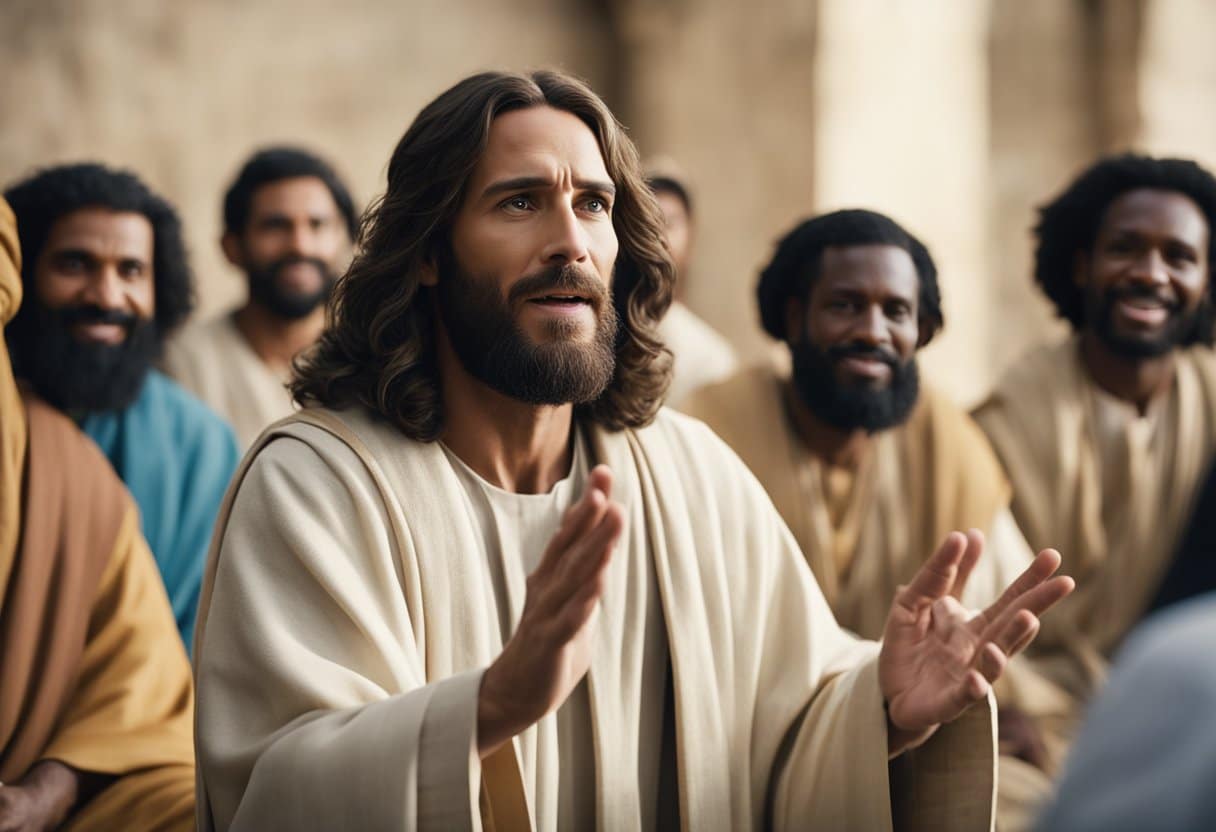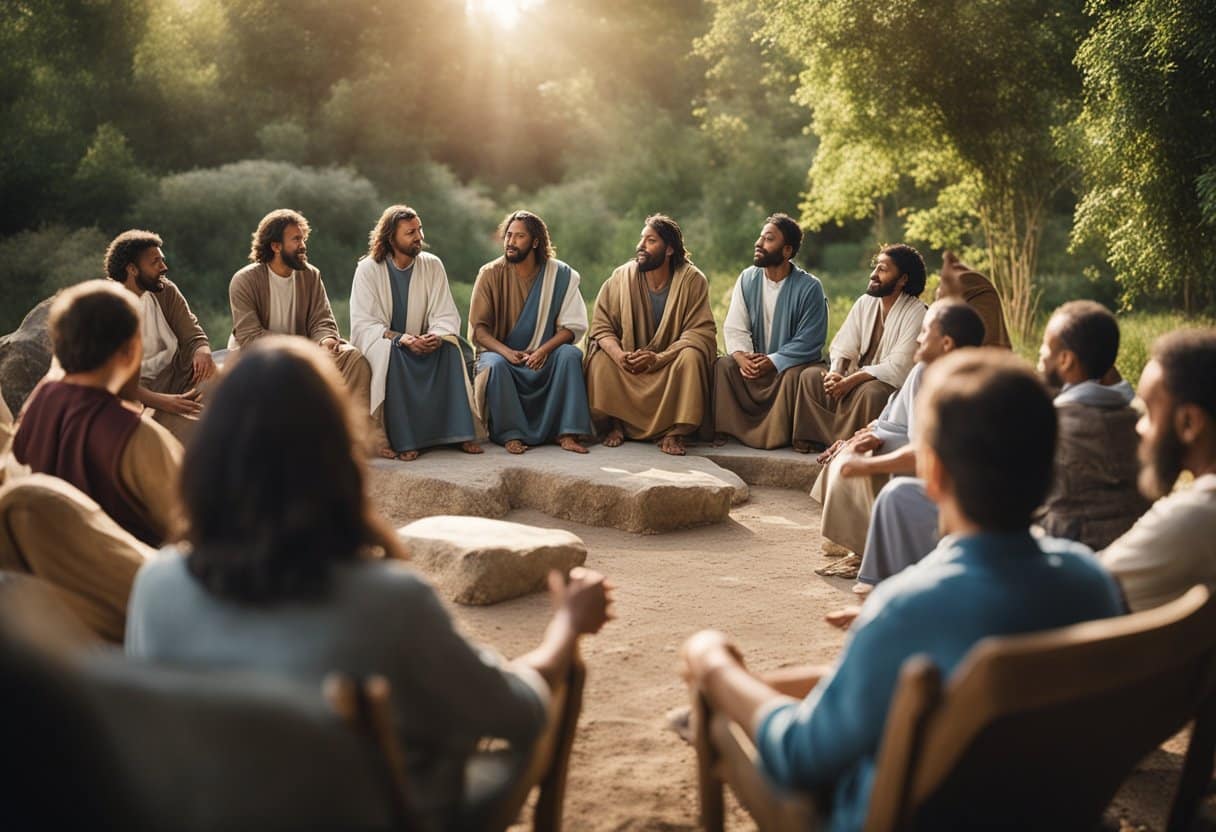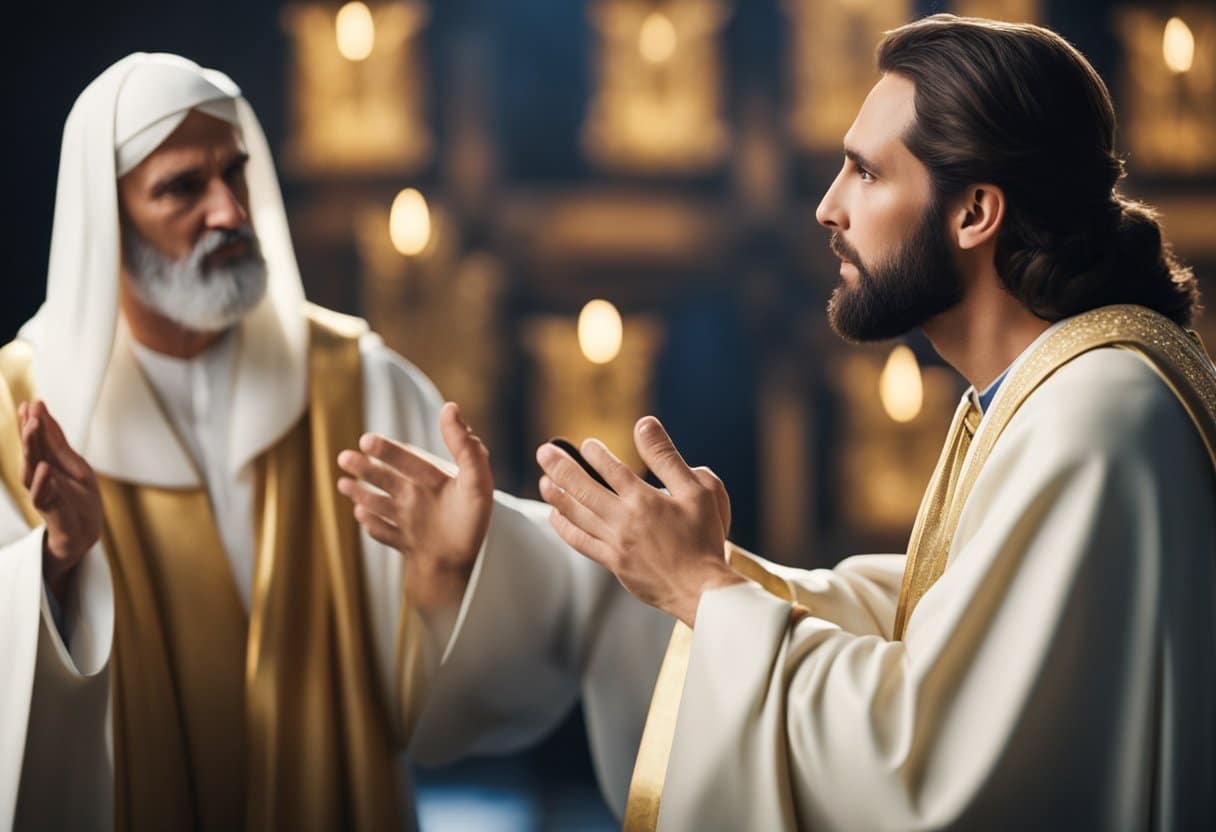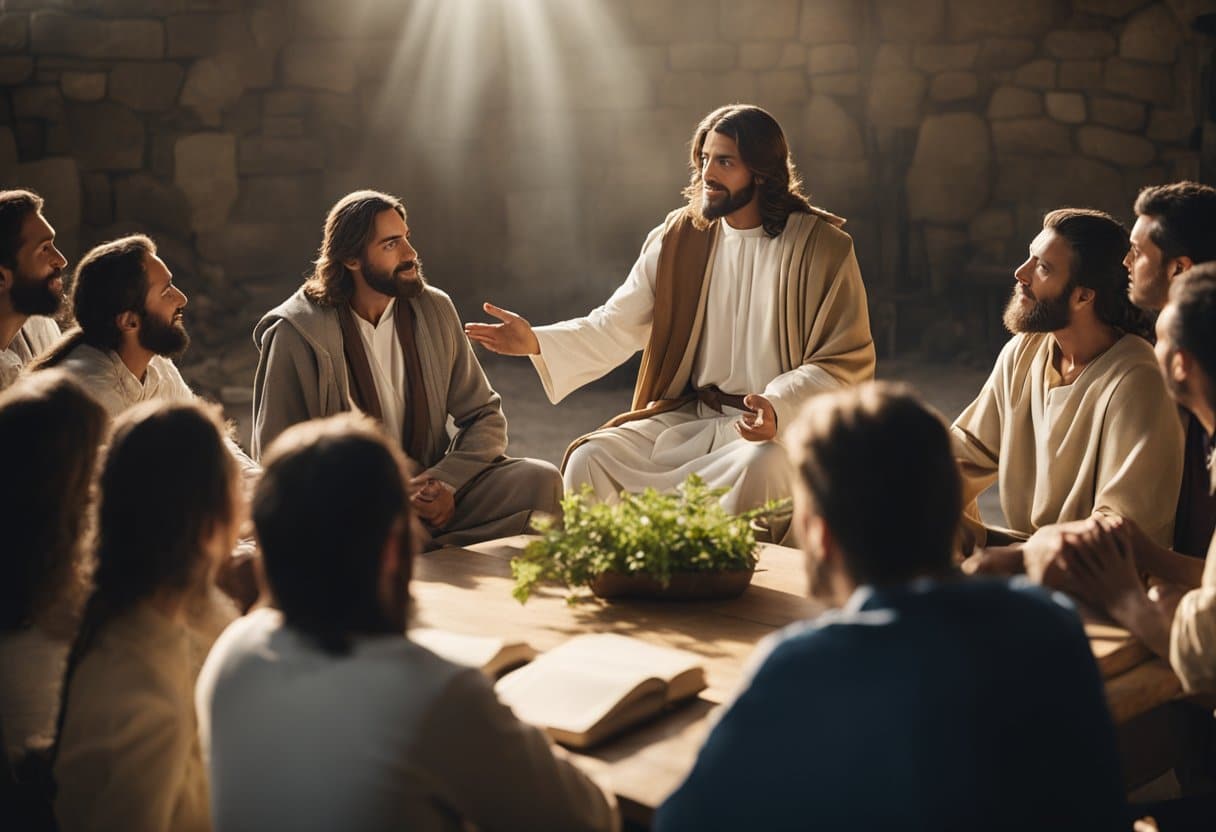If you’re interested in Christianity, you’ve probably heard of the term “discipleship.” This term refers to the process of becoming a follower of Jesus Christ and learning to live according to His teachings.
But how Jesus made disciples? What was His process for teaching and training His followers?

According to the Bible, Jesus began by selecting twelve men to be His disciples. These men were not highly educated or influential; in fact, many of them were fishermen or tax collectors. However, Jesus saw something in them that made Him believe they could be His followers and carry on His work after He was gone. He spent time with them, teaching them about God’s kingdom and showing them how to live in a way that pleased God.
As Jesus’ disciples spent time with Him, they began to understand more about His teachings and what it meant to follow Him.
They learned from His example, seeing how He interacted with people and how He lived out His faith in everyday life. They also had the opportunity to ask Him questions and receive answers directly from Him.
In this way, Jesus was able to build a strong foundation of faith and knowledge in His disciples, preparing them to carry on His work after He was gone.
The Call of the Disciples
Jesus’ ministry began with a call to follow him. He invited people to become his disciples and learn from him.
This call to follow Jesus was not just an invitation to observe him, but to become a part of his mission. Jesus chose twelve disciples to be his closest followers and to continue his work after he was gone.
Invitation to Follow
Jesus’ call to follow him was an invitation to leave behind their old lives and become his disciples. He called out to Peter and Andrew, who were fishermen, and said, “Come, follow me, and I will make you fishers of men” (Matthew 4:19).
They immediately left their nets and followed him. Jesus also called James and John, who were also fishermen, and they left their boat and their father to follow him (Matthew 4:21-22).
Jesus did not just call fishermen to follow him. He also called Philip, who then brought Nathanael (also known as Bartholomew) to Jesus (John 1:43-51). Jesus’ call was not limited to those who were already religious leaders or scholars. He called ordinary people to follow him and become his disciples.
Choosing the Twelve
Jesus chose twelve of his disciples to be his closest followers. He appointed them to be apostles, which means “sent ones” (Mark 3:14).
The twelve apostles were Simon (Peter), Andrew, James (son of Zebedee), John, Philip, Bartholomew, Matthew (also known as Levi), Thomas, James (son of Alphaeus), Thaddaeus (also known as Judas, son of James), Simon (the Zealot), and Judas Iscariot (who later betrayed Jesus).
Jesus chose these twelve apostles to be with him, to learn from him, and to continue his mission after he was gone.
He taught them about the kingdom of God and how to live as his followers. They witnessed his miracles and heard his teachings firsthand. Jesus invested in these twelve men, knowing that they would continue his work after he was gone.
In summary, Jesus made disciples by inviting people to follow him and become a part of his mission.
He chose twelve of his closest followers to be his apostles and to continue his work after he was gone. Jesus’ call was not limited to those who were already religious leaders or scholars but to ordinary people as well.
Principles of Discipleship

To understand how Jesus made disciples, we need to look at the principles that guided His ministry.
These principles can be summed up in three main areas: teaching and miracles, living in community, and mission and service.
Teaching and Miracles
Jesus’ primary method of disciple-making was through teaching and miracles. He taught His disciples the Gospel message and showed them how to live out their faith in practical ways.
He also performed miracles to demonstrate His power and authority over all things.
As a disciple, you must be willing to learn from Jesus and apply His teachings to your life. You must also be open to the work of the Holy Spirit in your life, allowing Him to perform miracles through you.
Living in Community
Jesus also emphasized the importance of living in a community.
He modeled this by choosing twelve disciples to live and work with Him. He taught them to love one another and to serve each other.
As a disciple, you must be willing to live in community with other believers. You must be willing to love and serve others, even when it is difficult.
Mission and Service
Finally, Jesus sent His disciples out on a mission to share the Gospel with others. He taught them to serve others and to be a light in the world.
As a disciple, you must be willing to serve others and to share the Gospel message with those around you. You must be willing to live out your faith in practical ways and to be a witness to others.
In conclusion, these principles of teaching and miracles, living in community, and mission and service are essential to making disciples. By following these principles, we can become effective disciples of Jesus Christ.
The Great Commission

As Jesus was about to ascend to heaven, He gave His disciples the Great Commission, which is recorded in Matthew 28:16-20. This commission is a call to make disciples of all nations. In this section, we will explore the Great Commission and what it means for disciple-making.
Authority to Make Disciples
Jesus began the Great Commission by declaring that all authority in heaven and on earth had been given to Him.
This statement is significant because it establishes Jesus’ authority to make disciples. As a result, when we make disciples, we do so under the authority of Jesus Christ.
Baptizing and Teaching
The Great Commission also includes two specific instructions: baptizing and teaching. Jesus commanded His disciples to baptize new believers in the name of the Father, the Son, and the Holy Spirit.
Baptism is a public declaration of faith and a symbol of our identification with Christ.
In addition to baptizing, Jesus also commanded His disciples to teach new believers to obey everything He had commanded them. This teaching involves not only imparting knowledge but also modeling obedience to Christ’s commands.
As we make disciples, we are to teach them what it means to follow Jesus and how to live in obedience to Him. This teaching is not just for new believers but for all who desire to grow in their faith.
Role of the Holy Spirit

As you study how Jesus made disciples, it’s essential to understand the role of the Holy Spirit in the process. The Holy Spirit is the third person of the Trinity and is responsible for empowering and guiding believers in their spiritual growth and discipling others.
Empowerment for Discipleship
The Holy Spirit empowers believers to be witnesses for Christ and to make disciples (Acts 1:8).
This empowerment comes through the baptism of the Holy Spirit, which occurs when believers are filled with the Spirit and speak in tongues (Acts 2:4).
This baptism is not a one-time event but is an ongoing process of being filled with the Spirit (Ephesians 5:18).
As you disciple others, it’s essential to rely on the Holy Spirit’s power rather than your strength.
The Holy Spirit gives you the boldness to share the gospel and to speak the truth in love (Acts 4:31, Ephesians 6:19). Without the Holy Spirit’s empowerment, discipling others can become a daunting task.
Guidance and Growth
The Holy Spirit also guides believers in their spiritual growth and helps them to become more like Christ. The Spirit convicts believers of sin, righteousness, and judgment (John 16:8).
As you disciple others, it’s essential to rely on the Holy Spirit’s guidance rather than your wisdom. The Spirit will show you what to say and how to lead others in their spiritual growth (John 14:26).
The Holy Spirit also produces spiritual growth in the lives of believers. Galatians 5:22-23 lists the fruit of the Spirit, which includes love, joy, peace, patience, kindness, goodness, faithfulness, gentleness, and self-control.
As you disciple others, it’s essential to encourage them to rely on the Holy Spirit’s power to produce this fruit in their lives.
In conclusion, the Holy Spirit plays a vital role in how Jesus made disciples. As you disciple others, it’s essential to rely on the Holy Spirit’s power and guidance rather than your strength and wisdom.
The Spirit will empower you to be a witness for Christ and to make disciples and will guide you and others in spiritual growth.
Expanding the Movement

After Jesus’ resurrection, He gave His disciples the Great Commission to go and make disciples of all nations. This started the expansion of the church from Jerusalem to the nations.
From Jerusalem to the Nations
The movement of Jesus’ disciples started in Jerusalem, where they were first filled with the Holy Spirit and began preaching the Gospel.
The book of Acts records the spread of the Gospel from Jerusalem to Samaria, and then to the ends of the earth. As the disciples preached, multitudes of people believed and were added to the church.
The church in Jerusalem became a model for other churches to follow. The apostles and elders in Jerusalem sent out missionaries to other regions to spread the Gospel and establish new churches.
The church in Jerusalem also provided financial support to other churches, showing that the church was not just a local community, but a global movement.
Multiplication of Believers
Jesus’ strategy for making disciples was to invest deeply in a few people, who would then go out and make more disciples. This multiplication of believers was essential for the rapid expansion of the church.
The book of Acts records how the Gospel spread as believers shared their faith with others.
One example of this multiplication is found in the story of Philip and the Ethiopian eunuch.
Philip shared the Gospel with the eunuch, who believed and was baptized. The eunuch then went back to his own country and shared the Gospel with others, resulting in the establishment of a new church.
Another example is the missionary journey of Paul. Paul traveled to different regions, preaching the Gospel and establishing new churches.
He also appointed leaders in these churches, who would then go on to make more disciples and establish more churches.
